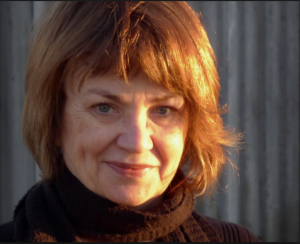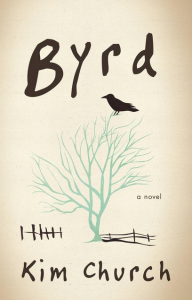I just recently finished reading her first novel, Byrd (Dzanc Books, 2014), and am happy to say I loved it and couldn’t put it down. Kim’s stories have appeared in Shenandoah, Mississippi Review, Painted Bride Quarterly, and elsewhere. A Pushcart Prize nominee, she has received fellowships from the North Carolina Arts Council, the Virginia Center for the Creative Arts, Millay Colony for the Arts, and Vermont Studio Center. She lives in Raleigh with her husband, artist Anthony Ulinski.
Bonnie ZoBell: Until now, you’ve been primarily a  short story writer and a poet. What made you decide to take the plunge and write a novel? Did this novel start out as a story? If so, how did it develop from that?
short story writer and a poet. What made you decide to take the plunge and write a novel? Did this novel start out as a story? If so, how did it develop from that?
Kim Church: Byrd started with an idea for a character. Years ago, a friend told me about a woman—an independent, capable, single woman—who had an unplanned pregnancy in her thirties and chose to give up her child for adoption. A childless mother: the idea haunted me. I wasn’t writing fiction yet, but I thought about this character a lot. My grown-up imaginary friend.
When I first took up fiction, I wrote only stories. I never tried a story about this character—I knew she would need more space. When my writing teacher told me I should write a novel, I knew Addie’s time had come.
BZ: Are you able to work on a novel and stories and poetry at the same time, or do you have to focus on only one?
KC: My first novel took such a long time, I’d have gone crazy if I hadn’t taken a break every now and then to write a story or a poem or a song, something I could actually finish. Those breaks were probably good for the book, too. Sometimes it helps to look away.
BZ: Addieis a woman who has a very intense romantic relationship early in her life and never has another like it. Why do you think she doesn’t? Do you think there are a lot of people like this in the world?
KC: First love is always intense, isn’t it? All those new, charged, tangled feelings, so exhilarating and terrifying. Addie talks about the “deep-down panic of real love, the jolt she always felt with Roland.”
Roland is Addie’s first love, but he’s not her last. As she matures, so does her idea of love. Here she is in middle age:
At forty-one, Addie is taking soy vitamins for hot flashes. She rinses her hair with henna to color the gray. William is forty-three and wears gel inserts in his shoes. Neither of them thinks of love the way they used to, as something to be fallen into, like a bed or a pit. It isn’t big and deep and abstract. Love is particulate. It’s fine. It accumulates like dust.
BZ: Your writing is beautiful, so lyrical and with such a wonderful storytelling voice. One can see how your poetic abilities advance your fiction. Do you feel that coming into play when you’re writing fiction? Does it ever hinder you?
KC: Thank you, Bonnie. I love the economy of poetry—keep things spare, choose the right details, put them in the right order and let them explode like popcorn in the reader’s mind. I like finding images, sounds, sensory details that can compress a lot of emotion and save me spelling things out too much.
I don’t often write poems these days, but I do write songs. Songwriting, I think, helps me structure my fiction. It’s less about individual words and more about how words are put together—the rhythm, the music they make.
BZ: I found Roland to be a fascinating character, so accurate of some men who just never quite get it together and yet still has his charms. I wanted to like him for Addie, but I never quite did. You do an excellent job of allowing the reader to see more of what he’s about than Addie herself sees. Why do you think she’s drawn to him?
KC: Haven’t we all had a Roland? Someone we fell for despite our better judgment? I think of Roland as a contradiction: a lovable narcissist. Addie isn’t blind to his narcissism, but she also sees the lovable part of him—the part that responds to her poems and claims her as a kindred spirit and confides in her. She sees the music part of him. He’s talented, a natural, and Addie is seduced by that. What the reader also gets to see about Roland, though Addie doesn’t, is that although he’s a terrible husband, he turns out to be a decent father.
BZ: If you were going to own your own bookstore, like Addie does by the end, what would you call it? Where would it be located? How would it be different than other bookstores?
KC: I would want Addie’s store: a used bookstore called Red Hammer for the faded mural on the side from when it used to be a hardware store. Just down the street there’s Cup A Joe, best coffee in town. The bookstore has an eclectic clientele—children, parents, college students, hip young intellectuals, middle-aged women in dowdy sweaters, elderly widows and widowers, greasy Ayn Rand disciples. One unusual thing about Addie’s store is that it hosts events. Not all used bookstores do.
BZ: What have you written since Byrd came out? Do you have any new big projects in mind?
KC: Before Byrd came out, I started a second novel that I’m inching my way back to, my next big project. So far this year, most of my writing has been Byrd-related: interviews, personal and craft essays. Turns out I like writing essays—a new form for me.
Thanks so much for your thoughtful questions. And thanks for bringing your Red Bird tour to North Carolina this summer. I loved being part of it.
BZ: Thank you for agreeing to the interview, Kim. This has been a pleasure. Maybe we can come up with a new reading tour called the Black Byrd Tour so we Bird Girls can finagle a way of getting to see each other again.


Leave A Comment